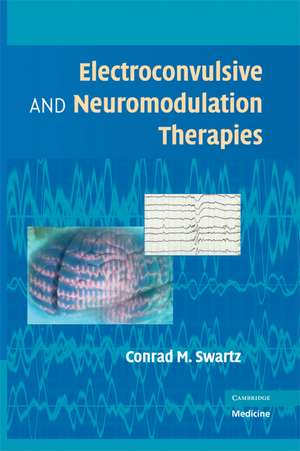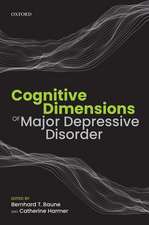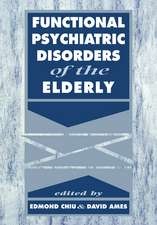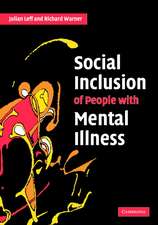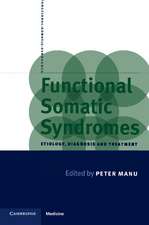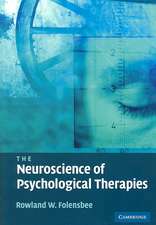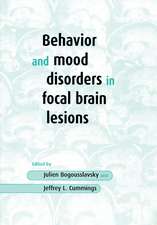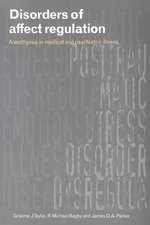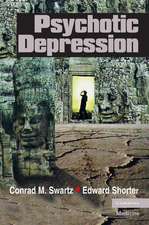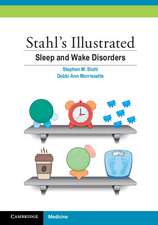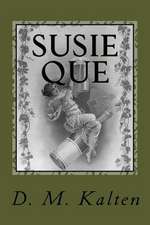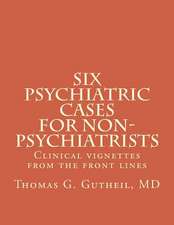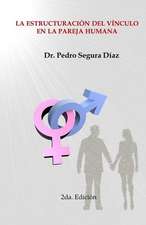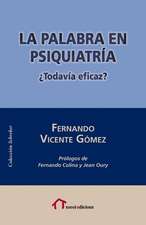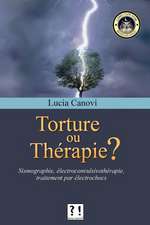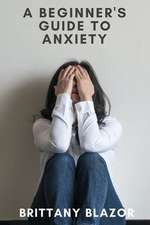Electroconvulsive and Neuromodulation Therapies
Editat de Conrad M. Swartz MDen Limba Engleză Hardback – mar 2009
Preț: 948.51 lei
Preț vechi: 998.42 lei
-5% Nou
Puncte Express: 1423
Preț estimativ în valută:
181.52€ • 188.81$ • 149.86£
181.52€ • 188.81$ • 149.86£
Carte disponibilă
Livrare economică 25 martie-08 aprilie
Preluare comenzi: 021 569.72.76
Specificații
ISBN-13: 9780521883887
ISBN-10: 0521883881
Pagini: 648
Ilustrații: 34 b/w illus. 9 colour illus. 22 tables
Dimensiuni: 184 x 261 x 42 mm
Greutate: 1.68 kg
Ediția:1
Editura: Cambridge University Press
Colecția Cambridge University Press
Locul publicării:New York, United States
ISBN-10: 0521883881
Pagini: 648
Ilustrații: 34 b/w illus. 9 colour illus. 22 tables
Dimensiuni: 184 x 261 x 42 mm
Greutate: 1.68 kg
Ediția:1
Editura: Cambridge University Press
Colecția Cambridge University Press
Locul publicării:New York, United States
Cuprins
Preface Conrad M. Swartz; Part I. Scientific and Experimental Bases of ECT: 1. ECT and electricity Conrad M. Swartz; 2. Non-electrical convulsive therapies Niall McCrae; 3. Neurochemical effects of electrically induced seizures: relevance to the antidepressant mechanism of ECT Renana Eitan, Bernard Lerer, and Galit Landshut; 4. Hypothesized mechanisms and sites of action of ECT Nikolaus Michael; 5. Brain imaging and ECT Hal Blumenfeld and Kathy Peng; 6. Evidence for ECT efficacy in mood disorders Keith Rasmussen; 7. Clinical evidence for the efficacy of ECT in the treatment of catatonia and psychoses Gabor Gazdag, Gabor Ungvari, Stephan Mann, and Stanley Caroff; 8. Hormonal effects of ECT Conrad M. Swartz; Part II. Historical, Societal and Geographic Perspectives: 9. History of electroconvulsive therapy Edward Shorter; 10. ECT in biographical books and movies Andrew McDonald and Garry Walter; 11. Professional barriers to offering or providing electroconvulsive therapy William Reid; 12. Legislation that regulates, limits or bans ECT Alan Felthous; Part III. International Perspectives: 13. ECT availability in the United States Barbara Rohland and Michelle Magid; 14. ECT in Scandinavia and the UK Susan Benbow and Tom Bolwig; 15. Electroconvulsive therapy in continental western Europe: a literature review Walter W. van den Broek and Pascal Sienaert; 16. ECT in Asia Sidney Chang; 17. History of ECT in the Russian Federation Alexander Nelson and Nataliya Giagou; 18. ECT in Latin America Moacyr Alexandro Rosa and Marina Odebrecht Rosa; Part IV. Administrative Perspectives: 19. ECT hospital policy and quality assurance Barry Alan Kramer; 20. Staff management and physical layout for ECT Jerry Lewis; 21. ECT forms Jerry Lewis; Part V. The Clinical Manual: 22. Patient selection and ECT indications Conrad M. Swartz; 23. ECT or antipsychotic drugs (or benzodiazepines for catatonia) Conrad M. Swartz; 24. Informed consent Peter Rosenquist; 25. ECT in the medically ill Keith Rasmussen and Paul Mueller; 26. Anesthesia for ECT Charles Kellner, Dongchen Li, and Limore Maron; 27. Stimulus electrode placement Conrad M. Swartz; 28. Stimulus dosing W. Vaughn McCall; 29. EEG monitoring and implications Hideki Azuma; 30. ECT cognitive effects and testing J. Stuart Lawson; 31. ECT methods in children and adolescents Garry Walter, Colleen Loo, and Joseph Rey; 32. Post-ECT evaluation and prophylaxis Walter W. van den Broek and Tom K. Birkenhager; 33. Ambulatory and maintenance ECT Charles Kellner and Unnati Patel; Part VI. Neuromodulation Treatment: 34. Transcranial magnetic stimulation (TMS) Pinhas Dannon and Oded Rosenberg; 35. Vagus nerve stimulation: indications, efficacy and methods Mustafa M. Husain, Shawn McClintock, and Kenneth Trevino; 36. Deep brain stimulation: methods, indications, locations, and efficacy Thomas Schlaepfer and B. H. Bewernick; 37. Transcranial direct current stimulation (tDCS) Felipe Fregni and Julie Williams.
Recenzii
'… I anticipate that an ECT practitioner will either want his or her own copy of this book, or at least have one available in the local library. The editor and publisher are to be congratulated for providing this valuable resource.' Allan Scott, MD, FRCPsych, Royal Edinburgh Hospital
'It will serve as the benchmark for books covering these important treatment modalities and should be required reading for any clinicians who treat patients with severe psychiatric disorders.' Doody's
'… an important achievement … There is nothing like it anywhere on the subject. It should be on the bookshelf of anyone practising or intending to practise ECT … will contribute worldwide to the understanding and advancement of ECT and other neurotherapeutic modalities.' The American Journal of Psychiatry
'It will serve as the benchmark for books covering these important treatment modalities and should be required reading for any clinicians who treat patients with severe psychiatric disorders.' Doody's
'… an important achievement … There is nothing like it anywhere on the subject. It should be on the bookshelf of anyone practising or intending to practise ECT … will contribute worldwide to the understanding and advancement of ECT and other neurotherapeutic modalities.' The American Journal of Psychiatry
Descriere
The definitive reference on electroconvulsive and neuromodulation therapy, covering the scientific basis, clinical practice, and administrative perspectives for ECT use.
